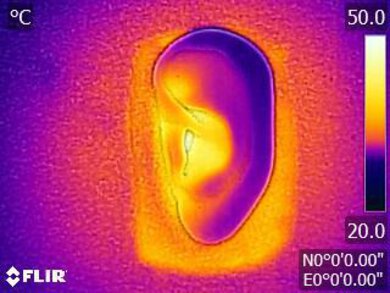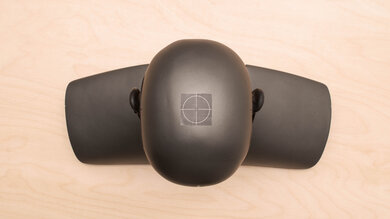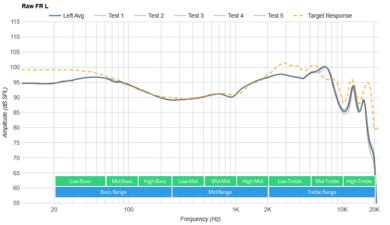The Razer Hammerhead True Wireless Pro are noise cancelling (ANC) in-ears. They're hybrid headphones designed for casual use and Bluetooth gaming. They have a low-latency gaming mode to help ensure that your audio and visuals stay in sync. Their companion app also offers a graphic EQ and presets, meaning you can tweak their sound to your liking.
Our Verdict
The Razer Hammerhead True Wireless Pro are good for neutral sound. Using their THX preset, they have a neutral sound suitable for most kinds of audio genres. Although they lack low-bass, their companion app has a graphic EQ and presets so you can tweak their sound to better suit your needs. They also have consistent bass and treble delivery. Unfortunately, their closed-back and in-ear design can make their passive soundstage seem small and closed-off.
- Well-built and stable in-ear fit.
- Graphic EQ and presets available.
- Bad passive soundstage.
The Razer Hammerhead True Wireless Pro are decent for commute and travel. They're decently comfortable and easy to take on the go, especially if you're into mobile gaming. They also have a low latency 'Game Mode' to help reduce audio synching issues when connected to your smartphone. Their active noise cancelling feature struggles to effectively block out bass-range noise like bus or train engines, though. Their around 5 hours of playback may not last through long flights, either. Luckily, the case comes with four additional charges, and you can even use one earbud while the other charges.
- Well-built and stable in-ear fit.
- Mediocre noise isolation performance.
The Razer Hammerhead True Wireless Pro are great for sports and fitness. These small in-ears are decently comfortable and have a stable in-ear fit, meaning they won't fall out during moderate physical activity. They're also rated IPX4 for water resistance. Thanks to their truly wireless design, there aren't any cables that could snag on something and pull them out of your ears.
- Well-built and stable in-ear fit.
- IPX4 rating.
- Bad passive soundstage.
The Razer Hammerhead True Wireless Pro are alright for office use. They're decently comfortable and don't leak too much audio, which is good if you have coworkers nearby. They also have an ANC system, and while it has a mediocre overall performance, it can still reduce ambient chatter around you. Their around 5-hour continuous battery life may also require you to take a break in your day to recharge them if you're working a 9-5 job.
- Well-built and stable in-ear fit.
- Graphic EQ and presets available.
- No multi-device or NFC pairing.
The Razer Hammerhead True Wireless Pro aren't recommended for wireless gaming. They can only be used via Bluetooth, which means they aren't compatible with Xbox One or PS4. While they'll connect to Bluetooth-enabled PCs, their default latency may be too high. That said, they have a lower latency 'Game Mode' that you can use to help their performance if you want to game on your smartphone.
The Razer Hammerhead True Wireless Pro are Bluetooth-only headphones that can't be used wired.
The Razer Hammerhead True Wireless Pro are passable for phone calls. The integrated mic does a good job of recording your voice, which sounds neutral, although a bit thin and muffled. You won't have a problem being understood by whoever's on the other end of the line, though. That said, the mic really struggles to separate your voice from a moderately loud environment and is best suited for taking calls in a quieter location.
- Well-built and stable in-ear fit.
- Mic has good recording quality.
- Mediocre noise isolation performance.
- Bad passive soundstage.
Changelog
- Updated Dec 06, 2023: We've added a comparison between these headphones and the Sony INZONE Buds Truly Wireless in Battery.
- Updated Nov 09, 2023: We've retested Virtual Soundstage as these headphones have a THX EQ preset and are THX certified. However, neither feature is multi-channel virtual surround support.
- Updated Aug 29, 2023: Added a comparison to the Razer Moray in the Xbox Compatibilitybox.
- Updated Aug 23, 2023: We've added a comparison between these headphones and the Razer Hammerhead Pro HyperSpeed True Wireless in Style.
Check Price
Differences Between Sizes And Variants
The Razer Hammerhead True Wireless Pro come in 'Classic Black', and you can see the label for our model here. If you come across another variant, please let us know in the discussions and we'll update our review.
Popular Headphones Comparisons
The Razer Hammerhead True Wireless Pro are the upgraded version of the Razer Hammerhead True Wireless. With this update, Razer has improved their fit, meaning they're more comfortable, and added another charge to the carrying case. The carrying case's lid also feels sturdier, which helps protect your headphones when you're on the go. These headphones have an active noise cancelling (ANC) feature, too. However, it does a mediocre job of blocking out background noise.
Check out our recommendations for the best wireless Bluetooth earbuds, the best noise cancelling earbuds and in-ear headphones, and the best earbuds for bass.
The Sony INZONE Buds Truly Wireless are better for wireless gaming than the Razer Hammerhead True Wireless Pro. While the Razer have a more balanced sound profile and better mic recording quality, which you might prefer, they're Bluetooth-only and don't have a dedicated wireless dongle like the Sony. They can only connect to PCs via Bluetooth, and even with their "Game" mode enabled, the latency is still too high for many games. The Sony also have a superior noise isolation performance and a longer continuous battery life, but their LE Audio codec severely limits which devices they're compatible with over Bluetooth.
The Razer Hammerhead True Wireless Pro are better headphones for most uses than the Razer Hammerhead USB-C ANC. The True Wireless Pro are more comfortable, have a more neutral sound profile which some users may like, and have a companion app with a graphic EQ and presets so you can tweak their sound. Their ANC system also offers a slightly better overall performance. However, the USB-C ANC have a wired USB-C connection which some users may prefer since this design ensures next-to-zero audio latency.
The Razer Hammerhead True Wireless 2021 are slightly better headphones Razer Hammerhead True Wireless Pro. Both headphones are well-built and have a comfortable fit. They also have similar battery performances. However, the 2021 have a better noise isolation performance and customizable RGB lighting. Conversely, the Pro have a more neutral sound profile, which some users may prefer.
The Razer Hammerhead Pro HyperSpeed True Wireless are better in-ears than the Razer Hammerhead True Wireless Pro. While both buds are comfortable and well-built, the Pro HyperSpeed have a better noise isolation performance, customizable RGB lighting, and come with a USB-C dongle for lower latency.
Test Results


The Razer Hammerhead True Wireless Pro have a very similar look to the Razer Hammerhead True Wireless 2021. They have a matte black design with similarly-sized stems and a green Razer logo on both earbuds' rounded back. If you care about customizable RGB lighting in your buds, you'll want to consider the Razer Hammerhead Pro HyperSpeed True Wireless instead, as their logo lights up.

The Razer Hammerhead True Wireless Pro are decently comfortable headphones. They feel more comfortable than the Razer Hammerhead True Wireless as they're in-ears with silicone ear tips. They also come with a variety of different ear tip sizes so you can find a comfortable fit for you. They don't go too deep into your ear, either. However, they're a little bulky and stick out a bit.

The Razer Hammerhead Pro have mediocre controls. All the controls can be done on either bud, and the touch surfaces are very responsive. You can tap once to answer/end calls as well as to play/pause audio. You can also tap and hold for two seconds to cycle between active noise cancelling on, off, and 'Ambient' mode, which allows you to hear sound around you without turning off your audio. You can double-tap to skip to the next track and triple-tap to return to the previous track. You can also triple-tap and hold for two seconds to turn their low latency 'Gaming Mode' on and off. Unfortunately, accessing voice assistant isn't consistent and you may accidentally change your ANC settings instead.

Like most truly wireless earbuds, these headphones are exceptionally portable. They can fit into most pockets, and their carrying case is quite small too.

The Razer Hammerhead True Wireless Pro have a decent carrying case. It's made of plastic and has an LED light to let you know when it's fully charged or charging. It'll protect your headphones from minor falls or scratches.

The build quality is good. They're made of plastic but feel durable. They also have an IPX4 rating for water resistance, although we don't currently test for it. They come with a few differently-sized ear tips, and the case has a sturdy-feeling lid, especially when compared to that of the Razer Hammerhead True Wireless 2021.

The Razer Hammerhead True Wireless Pro are stable earbuds. Although they don't have stability fins, they'll stay in your ears during moderate physical exercise. However, they can fall out with higher-intensity shakes.

- Razer Hammerhead True Wireless Proheadphones
- 3x Set of silicone tips
- 3x Set of translucent silicone tips
- 1x Set of foam tips
- Charging case
- USB-C to USB-A charging cable
- Razer stickers
- Manuals
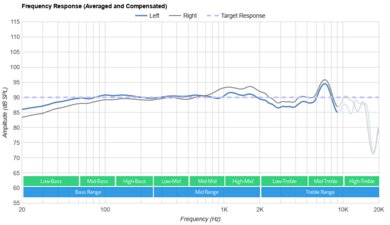
Using the THX EQ, the Razer Hammerhead True Wireless Pro have a surprisingly neutral sound profile. Although they lack a thumpy low-bass, they reproduce vocals and instruments very clearly. Their companion app also offers a graphic EQ and presets so that you can tweak their sound to your liking.
When we originally tested these headphones, we used the 'Flat' EQ. However, users have reported that the buds' placement affects their ability to achieve a proper seal. After retesting the buds, we noticed a difference between the Flat EQ and THX, and you can see a comparison between modes here. Keep in mind that the THX EQ results in a more neutral sound than the Flat EQ.
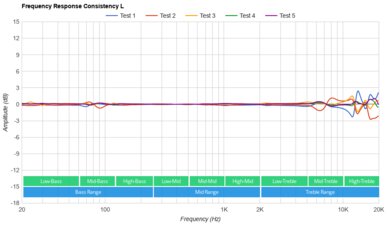
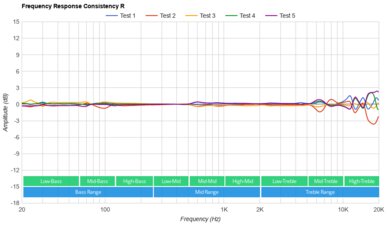
The frequency response consistency is outstanding. Assuming you achieve a proper fit with the included tips, you'll get consistent sound reproduction every time you use them.
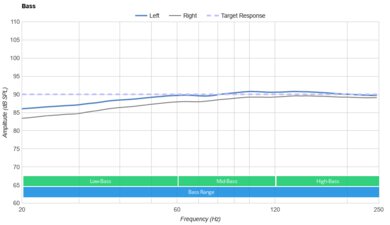
These buds have excellent bass accuracy. Although the low-bass is very underemphasized and mixes lack thump and rumble, the mid and high-bass are a lot more neutral. As a result, tracks have adequate punch and warmth.
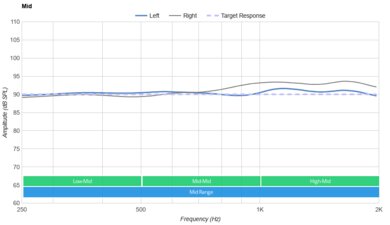
Their mid accuracy is outstanding. The range is very flat and neutral, even though there's a slight driver mismatch in the mid to high-mid range. Vocals and instruments are present, clear, and detailed. However, these sounds are reproduced brighter and more intensely by the right driver.

The Razer Hammerhead Pro's treble accuracy is great. The response is fairly flat, although there's a slight dip throughout the low-treble. Vocals and lead instruments are a little veiled. However, sibilants like cymbals are bright.
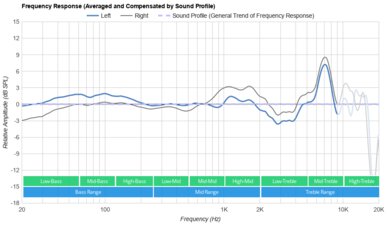
These headphones have good peaks and dips performance. Unfortunately, there's a slight mismatch between the left and right drivers throughout the frequency response. The left driver is more overemphasized in the bass range, which adds more thump, punch, and warmth to mixes. A peak in the high-mid affects the right driver more prominently, which makes vocals and instruments sound harsh. A dip in the low-treble hurts the comprehensibility of vocals and instruments in the left driver, while a peak in the mid-treble affects both drivers and makes sibilants like cymbals piercing.


The Razer Hammerhead True Wireless Pro's stereo imaging is great. The group delay is below the audibility threshold for the entire range, ensuring a tight bass and transparent treble reproduction. Although there's a peak in the phase response in the mid-mid, it's not noticeable with real-life content. As a result, the L/R drivers of our unit are very well-matched in amplitude, frequency, and phase, which are important for the accurate placement and localization of objects and instruments (like voices and footsteps) in the stereo image.
Like most in-ears, these buds have a bad passive soundstage. One important factor in creating a large and spacious soundstage is the activation of the outer ear by different resonances. However, in-ears bypass the outer ear altogether, resulting in a soundstage that's perceived as small and coming from inside your head rather than from out in front of you. They also sound less spacious than open-back headphones.
These headphones have THX certification, which the manufacturer advertises to ensure users get a balanced frequency response, low distortion, and a solid seal for noise isolation. They also have a THX EQ preset that you can access in the companion app. You can only turn this feature on and off, and it's flatter in frequency response than the 'Flat' EQ preset. You can see a comparison here. However, this isn't true 7.1 or multi-channel virtual surround support, so your audio will still be in stereo.
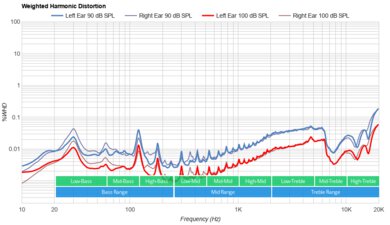
The Razer Hammerhead True Wireless Pro's weighted harmonic distortion performance is good. All frequencies fall within good levels, resulting in clear and pure audio reproduction.
These are the settings we used to test these headphones. Our results are only valid when using this configuration.

The Razer Hammerhead True Wireless Pro's noise isolation performance is mediocre. The ANC struggles to block out the low rumble of bus engines, so they're not the best choice if you want to use them during your daily commute. That said, they do a better job of cutting down ambient chatter and can reduce some treble-range noise, like the hum of an AC unit. If you're looking for Razer in-ears with a better noise isolation performance, check out the Razer Hammerhead True Wireless 2021.
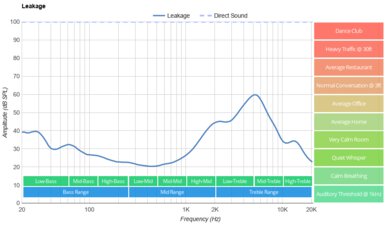
The Razer Hammerhead True Wireless Pro's leakage performance is great. Most of the leakage is concentrated in the treble range. If you're listening to your audio at max volume, those around you may hear a small part of it, although it sounds thin.
These headphones have an integrated microphone.

The recording quality of the Razer Hammerhead True Wireless Pro's mic is good. Your voice sounds neutral, although a bit thin and muffled. People on the other end of the line won't have too much of a problem understanding you, though.
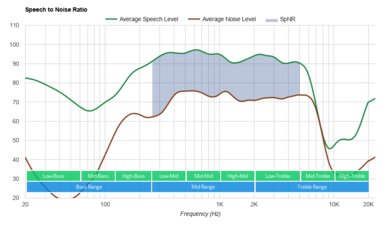
The mic's noise handling is sub-par. It has a hard time separating your voice from moderately noisy environments. However, you won't have too much of a problem if you're talking in a quieter space like at home.
The Razer Hammerhead True Wireless Pro have an alright battery performance. The manufacturer advertises them as having around four hours of continuous battery life. However, we tested five hours, which is still quite short compared to other gaming buds like the Sony INZONE Buds Truly Wireless. Battery life can vary according to usage, so your experience may differ. Luckily, the carrying case has around four additional charges to help extend your listening time. You can also charge one earbud while using the other, which is handy.

Razer Hammerhead Pro is a good app. Although it's simple in design, it has a 10-band graphic EQ and presets so you can tweak their sound profile. You can also remap their controls and activate their THX EQ preset.
The Razer Hammerhead Pro have fair Bluetooth connectivity. You can't pair them with more than one device at a time, and they don't support NFC pairing, making it easier to pair them via Bluetooth. Although they have lower latency on Android, their high latency on PC and iOS may impact video streaming. They also have a lower latency 'Game Mode', which lowers their latency to 88 ms on PC, -72 ms on iOS, and 90 ms on Android. Some apps compensate for latency differently, so your real-life usage may vary.
These headphones are Bluetooth-only, unlike the EPOS GTW 270 Hybrid Truly Wireless, which come with a USB-C dongle for low-latency audio playback and are also Bluetooth-compatible.

These headphones are Bluetooth-only, and you can't use them wired. These come with a USB-C cable to charge their carrying case.
These Bluetooth-only headphones aren't compatible with the Xbox One. If you're looking for compatible earbuds from this manufacturer, the Razer Moray have a wired connection that allows you to plug their AUX jack into your game controller.

